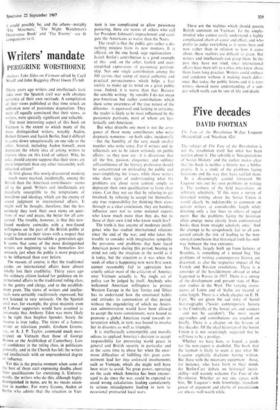Five decades
DAVID FOOTMAN
The Fate of the Revolution Walter Laqueur (Weidenfeld and Nicolson 42s) The subject of The Fate of the Revolution is not the revolution itself but what has been written about it. The sub-title is 'Interpretations of Soviet History' and the author makes clear that his book is neither a history nor a biblio- graphy. It is a study of the problems facing historians and the way they have tackled them.
In a disarmingly candid foreword Mr Laqueur sets out his own problems in writing it. The vastness of the field necessitates an arbitrary selectivity. 'If this were a survey of historical writing about the Soviet Union it would clearly be indefensible to comment on certain writers at considerable length while devoting only a few lines to others of equal merit. But the problems facing the historian often emerge more clearly from controversial books than from straight scholarly ones.' And the attempt to be scrupulously fair to all con- cerned entails the risk of leading to the non- sensical conclusion that historical truth lies mid- way between the two extremes.
The book, largely built up from lectures at Brandeis, is something of a mixed bag. The problems of writing contemporary history are discussed, as also the respective impact of the French and Russian revolutions. There is a reminder of the bewilderment abroad at what happened in Russia in 1917. There is a survey of the development and present state of Rus- sian studies in the West. The varying assess- ments of Lenin and of Stalin are treated at some length. There is a whole chapter on E. H. Carr. We are given the sad story of Soviet historiography ('Soviet contemporary history is the Cinderella of the Soviet arts and sciences --and not by accident'). The most recent approaches and contributions arc touched on briefly. There is a chapter on the lessons of five decades. Of the ideal historian of the Soviet Union it is not surprisingly suggested that he will have to be a prodigy.
Whether we have here, as hoped, a guide for the non-expert is doubtful. The book that the layman is likely to want is just what Mr Laqueur explicitly disclaims having written. But those with the necessary equipment- those, for instance, who have fresh in their minds the Berlin-Carr debate on historical inevit- ability—will warmly welcome The Fate of the Revolution. Whether or not one agrees with him, Mr Laqueur's wide knowledge, trenchant power of argument and clarity of presentation are always well worth while.


































 Previous page
Previous page